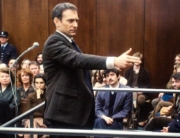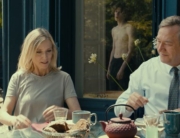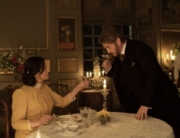In director Emily Atef’s honestly realized drama, Vicky Krieps stars as Hélène, a thirtysomething wife with a rare, and likely fatal, lung disease who struggles to reconcile her depressed state with her husband Mathieu’s seeming refusal to accept that her condition is uncurable. Instead, he presses her to agree to an experimental treatment that she is reluctant to try.
From the start, Atef perceptively depicts a relationship straining from the weight of such a momentous diagnosis. After Hélène tells him she needs space to be alone, Mathieu agrees and silently leaves for the evening. Hélène—who earlier googled “what to do when you are dying” and searched various new-agey blogs that don’t interest her—has a Zoom call with a cancer patient named Mister, whose online photos intrigue her with their discerning eye. It turns out he lives in Norway (Hélène and Mathieu live in Paris), and she, sensing a kindred spirit, firmly informs her husband that she needs to leave and spend some time in that spectacular northern landscape, hoping that it will give her a sense of balance and stability that she cannot find at home.
Hélène takes a long train ride to stay with Mister in his remote cabin. Here Atef relies on predictable dramatic beats—Hélène walks through the woods and swims in the cold water; Mister turns out to be a friendly, supportive (but platonic) companion named Bent; and Mathieu arrives to check on her and see if he can bring her back for treatment before it’s too late. Nevertheless, the film still becomes engrossing, largely thanks to the sympathetic writing and the flawless cast.
Bjørn Floberg gives Bent dignity and humor to make him more than a mere plot device, and Gaspard Ulliel—in what was tragically one of his last roles before his untimely death last year at age 37—plays Mathieu with elegant restraint. Yet, as is usually the case, it’s Krieps who provides emotional depth in her lancing, truthful performance.
Indeed, there are a couple scenes in which Krieps assumes the imposing mantle of Liv Ullmann in any number of intimate Bergman classics. In one, Atef keeps the camera up close as Hélène and Mathieu start to make love, but Hélène, soon short of breath and coughing, is unable to continue. Krieps plays these moments with an almost frightening physical intensity that is difficult to watch. Then in the final shots, in which Atef smartly cuts to closeups, Hélène contemplates her future, however long that may be. Krieps goes through several sensitive facial expressions comprising sadness and uncertainty, along with a glimmer of hope and even a ghost of a smile, but with absolutely no histrionics or hysterics.
It’s a beautifully understated ending to a film that flirts with, but never sinks to, unnecessary melodrama.







Leave A Comment